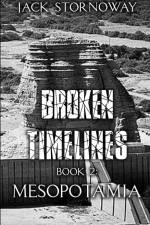von Jack Stornoway
22,00 €
The current conventional Mesopotamian timeline of dynastic Mesopotamia is impossible. Believing in it means endorsing the idea the Egyptians lagged thousand years behind the Sumerians technologically during the Middle Kingdom. This timeline forces the bronze age Harappan civilization to have existed as recently as 1200 BC, even as an iron age civilization had existed on the Ganges since at least 1800 BC. It is also not what the ancient Sumerians actually recorded, so believing it means believing that modern Assyriologists know more about ancient Sumer than the ancient Sumerians themselves. Given that the ancient Sumerians lived through it, and all Assyriologists have to go on is random bits of clay-tablets and mostly ruined city-mounds, this seems like an incredible stretch of the imagination. The fact is Assyriologists cant' and don't need to explain the anachronisms, because the Mesopotamian timeline is synchronized with the Egyptian timeline, which Egyptologists insist on keeping as short as possible.The idea that the ancient Sumerians built their earliest cities in the marshlands of Southern Iraq using stone imported from other countries is entirely illogical, they would have simply built them using mud-bricks as they did in the later periods. As the stone had to have been locally quarried, the region could not have been a marshland when the earliest cities built, meaning that the oldest levels of Uruk and Eridu must date back to before the region began turning into a marshland circa 9,000 years ago. The fact that they switched to using mud-bricks simply proves that the water-levels rose during the course of Sumerian history, flooding their farmlands, and ultimately forcing the Mesopotamian cultures to migrate northward to Akkadia, Babylonia, and Assyria. The fact that Assyriologists ignore the ancient Sumerian records of the antediluvian era is probably for the best, as they cannot even accept that the 1st Kish Dynasty went back to 25,000 BC, even though it has been proven that grains was being farmed in the region at that time.Unfortunately, the timeline of Egypt and Sumer are the two pillars that ancient history is built around. As the early Sumerians were trading with the early Egyptians, Assyriologists have been forced to synchronize the Mesopotamian timeline with the preposterous timeline used by Egyptologists. While this means that most of Sumerian history is has to be ignored, is also effects the timelines of all other Eurasian cultures in contact with the Mesopotamian. The Harappan civilization of ancient India was trading with the Sumerians throughout its history and went into decline around the end of the Sumero-Akkadian dynastic period, which means the entire Harappan civilization is forced to correlate with the short Conventional Mesopotamian Timeline. This forced the entire Harappan timeline into a period of 2000 years, even though some of the archaeological sites in Pakistan and India have been carbon-dated back to over 8000 BC. These broken timelines then fan out further pulling the Minoans and Greeks, Iranians, and Chinese into this confusing mess.



